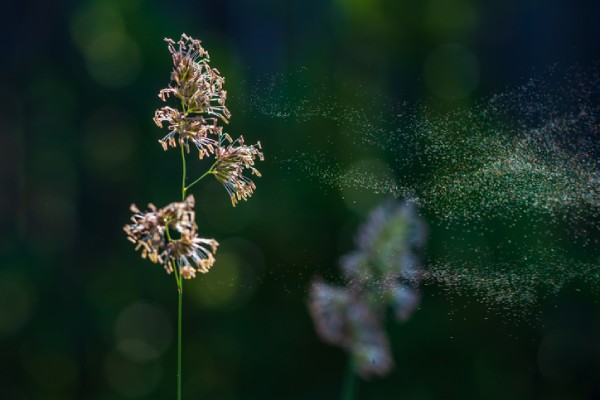As the seasons change, so does the air we breathe, bringing with it a host of allergens that can turn our daily lives into a constant battle against sneezes, sniffles, and itchy eyes.
In this comprehensive guide, we’ll dive deep into seasonal allergies, exploring hay fever symptoms, causes, and, most importantly, how you can find relief.
With the expertise of PharmaChoice pharmacists, your trusted healthcare partner, we aim to arm you with knowledge and solutions to navigate hay fever season with ease.
What Is Hay Fever (Allergic Rhinitis)?
Hay fever, medically known as allergic rhinitis, occurs when the immune system overreacts to particles in the air that are usually harmless, such as pollen, dust mites, mold spores, and pet dander.
The body’s immune system is designed to protect us from harmful substances like bacteria and viruses.
However, in people with hay fever, the immune system mistakenly identifies harmless airborne particles as dangerous invaders. In response, it produces antibodies called Immunoglobulin E (IgE) to attack these particles.
This immune response triggers the release of histamine and other chemicals, leading to the inflammation and symptoms of hay fever.
How Common Is Hay Fever?
Hay fever is a widespread condition, affecting a significant portion of the population, roughly 10 to 20% of Canadians, according to the Allergy, Asthma & Immunology Society of Ontario.
It’s not just a minor inconvenience; for many, it’s a major hindrance to enjoying everyday life. Seasonal changes, particularly in spring and fall, often trigger an increase in hay fever cases due to higher pollen counts.

Hay Fever Risk Factors – Who Is at Risk of Developing Hay Fever?
While hay fever can affect anyone, certain individuals are more susceptible due to a variety of risk factors. Understanding these factors can help identify those at higher risk and potentially aid them in mitigating exposure to common allergens.
Family History of Allergies
Genetics play a significant role in the likelihood of developing allergic conditions, including hay fever.
If you have close family members with allergies or allergic diseases such as asthma or eczema, your risk of developing hay fever is higher.
This genetic predisposition suggests that the immune system’s hypersensitivity to allergens is, in part, inherited.
Existing Allergic Conditions
Individuals with other allergic conditions are more prone to developing hay fever. Conditions like asthma and eczema are linked to an overactive immune response, similar to allergic rhinitis.
In fact, the conditions are so closely linked that 80% of people with asthma also suffer from allergic rhinitis or sinusitis, as explained by Asthma Canada!
If you already experience these conditions, your body is more likely to react adversely to airborne allergens, leading to hay fever symptoms.
When Do People Usually Get Hay Fever or Seasonal Allergies?
The timing and severity of hay fever symptoms can vary significantly depending on geographic location, weather conditions, and individual sensitivities to different allergens.
Seasonal Variations
- Spring: Tree pollen is the main culprit during the early spring months. As temperatures rise, trees begin to release pollen, which can trigger hay fever symptoms in sensitive individuals.
- Summer: Grass pollen takes over as the primary allergen during the late spring and early summer months. Grasses, including common types found in lawns and fields, release pollen that can cause significant discomfort.
- Fall: Weed pollen, especially from ragweed, becomes the predominant allergen in many areas during the fall. In addition to weeds, mold spores from fallen leaves and other organic matter can also contribute to hay fever symptoms.
Perennial Allergies
For some, hay fever is a year-round issue, often triggered by indoor allergens such as dust mites, pet dander, and mold. These perennial allergies can cause continuous symptoms, which may worsen during certain activities, such as cleaning, that stir up allergens.
Understanding these risk factors and seasonal patterns can help individuals anticipate and manage their hay fever symptoms more effectively. By recognizing the times of year you’re most at risk, you can take proactive steps to minimize exposure to allergens and seek appropriate treatment to alleviate symptoms.

Hay Fever Symptoms & Causes
Hay fever symptoms can range greatly in severity among individuals, from mild annoyances to severe conditions that interfere with day-to-day activities. Here are some of the most common symptoms associated with hay fever.
Symptoms of Hay Fever
- Itchy, runny, or stuffy nose
- Red, itchy, or watery eyes
- Headaches and sinus pressure
- Sneezing, coughing, or trouble breathing
Causes and Triggers of Hay Fever
The causes of hay fever can vary from person to person, but some of the most common culprits as explained by Mayo Clinic include:
- Pollen: From trees, grasses, and weeds, pollen is a major trigger for hay fever. Rural areas or regions with high vegetation can pose a higher risk during the pollen seasons.
- Dust Mites: These tiny creatures thrive in warm, humid environments, often found in bedding, upholstered furniture, and carpets.
- Pet Dander: Flakes of skin shed by cats, dogs, and other pets can trigger allergic reactions year-round.
- Mold Spores: Mold grows in damp, humid areas, both indoors and outdoors. Spores released into the air can trigger hay fever symptoms.
- Irritants: While not allergens themselves, substances like smoke, perfume, and cleaning solutions can irritate the airways and exacerbate hay fever symptoms.
Hay Fever vs Common Cold – Comparison
Distinguishing between hay fever and the common cold is essential for effective management and treatment. Despite some overlapping symptoms, there are key differences:
- Cause: Hay fever is an allergic reaction to airborne substances, whereas the common cold is caused by a viral infection.
- Symptom Onset: Hay fever symptoms can appear immediately after exposure to allergens and last as long as the exposure continues. Cold symptoms typically develop gradually and resolve within 7 to 10 days.
- Fever: A common cold may be accompanied by a low-grade fever, while hay fever does not cause an increase in body temperature.
- Itchy Eyes: This symptom is common in hay fever but rare in the common cold.
- Colour of Nasal Discharge: Hay fever usually causes clear, watery nasal discharge. A cold may start with clear discharge but can progress to thicker, yellow, or green discharge as the body fights the infection.
Understanding these differences is crucial for individuals to seek the appropriate treatment. While over-the-counter medications may alleviate symptoms of both conditions, addressing the underlying cause—whether it’s avoiding allergens or treating a viral infection—is key to effective management.
Hay Fever Diagnosis
Diagnosing hay fever is a critical step towards managing and alleviating its symptoms. Healthcare providers follow a systematic approach to diagnose this condition accurately.
Examinations by Your Healthcare Provider
The diagnostic process begins with a comprehensive evaluation by your healthcare provider, including:
Medical History and Physical Exam
A detailed discussion about your symptoms, their onset, duration, and any patterns or triggers you’ve noticed. Your doctor will also inquire about a family history of allergies or asthma, which can provide clues to your condition.
Additionally, your doctor may perform an examination, particularly of the nose, throat, eyes, and ears, to look for signs of allergic rhinitis such as swelling, redness, or nasal polyps.
Blood Allergy Test
Also known as a specific IgE blood test, this test measures the level of IgE antibodies in response to specific allergens. A blood sample is taken and analyzed for reactions to various allergens, helping to pinpoint the substances that trigger your hay fever symptoms.
Skin Prick Test
The skin prick test is a direct method for detecting allergic sensitivities:
Small drops of purified allergen extracts are placed on the skin, usually on the forearm or back, and the skin is lightly pricked or scratched. This introduces the allergen to the immune system’s cells in the skin.
If you’re allergic to a substance, a raised, red bump (similar to a mosquito bite) will appear at the test site, usually within 15-20 minutes.

Hay Fever Treatment
Effective management of hay fever involves a combination of avoiding known allergens and using medications to relieve symptoms.
Liquids and Pills
Oral antihistamines, such as Diphenhydramine, are the cornerstone of hay fever treatment, effectively relieving sneezing, itching, runny nose, and watery eyes. Decongestants can also be used for short-term relief of nasal stuffiness.
Eye Drops and Nasal Sprays
- Antihistamine Eye Drops: Such as Ketotifen and Olopatadine, provide quick relief for itchy, watery eyes.
- Corticosteroid Nasal Sprays: Like Fluticasone and Mometasone, reduce inflammation in the nasal passages, relieving congestion, sneezing, and runny nose.
- Over-The-Counter Saline Sprays: At PharmaChoice, we carry a range of affordable solutions, including Option+ Saline Nasal Rinse and 24Hr Nasal Allergy Relief.
Injections
Allergy shots (immunotherapy) are a long-term treatment option that can desensitize the body to allergens, gradually reducing the severity of allergic reactions.
Hay Fever Complications
Although not life-threatening, hay fever can lead to several complications if not properly managed:
- Poor Sleep: Symptoms like congestion and itchy eyes can disrupt sleep, leading to fatigue and decreased productivity.
- Reduced Quality of Life: Ongoing symptoms can interfere with daily activities, work, and school performance.
- Worsened Asthma Symptoms: For those with asthma, hay fever can trigger or exacerbate asthma attacks.
- Ear Infections and Sinusitis: Prolonged nasal congestion can lead to sinus infections (sinusitis) and middle ear infections (otitis media).
Understanding the diagnosis, treatment options, and potential complications of hay fever is essential for those affected. With the right management strategies, individuals can significantly reduce their symptoms and improve their quality of life.
Hay Fever Prevention – Can It Be Prevented?
Although it’s impossible to completely prevent hay fever, understanding and implementing certain lifestyle changes can greatly diminish the severity and frequency of symptoms.
The key to managing hay fever effectively lies in minimizing your exposure to the allergens that trigger your symptoms.
Hay Fever Precautions – Tips to Minimize Allergen Exposure
Adopting specific strategies can help reduce your contact with allergens and alleviate the discomfort caused by hay fever:
- Stay indoors on high-pollen days
- Wear sunglasses outdoors
- Wash hands after petting animals
- Change clothes and shower after being outside
- Use air purifiers
- Dry clothes indoors
When To Get Professional Advice For Hay Fever?
Despite taking precautions, some individuals may still experience significant hay fever symptoms. It’s important to know when to seek professional advice:
- Symptoms Persist or Worsen: If your symptoms continue unabated or worsen despite taking over-the-counter medications and implementing lifestyle changes, it’s time to consult a healthcare professional.
- Over-the-Counter Medications Don’t Provide Relief: Not all treatments work equally well for everyone. If you find that OTC medications are not effective, a healthcare provider can prescribe stronger medications or recommend alternative treatments.
- You Have Conditions That Exacerbate Hay Fever Symptoms: If you have asthma or another respiratory condition that is worsened by hay fever, professional guidance can help manage both conditions more effectively.
- Considering Allergy Shots (Immunotherapy): For those with severe hay fever, allergy shots may be recommended.
Seeking advice from a healthcare professional can provide you with a tailored treatment plan that addresses your specific symptoms and triggers, enabling you to manage your hay fever more effectively and improve your quality of life.

Keep Hey Fever Symptoms at Bay – Talk To Your PharmaChoice Pharmacist Today
Managing hay fever effectively requires a combination of strategies tailored to your specific triggers and symptoms.
With the right approach, including lifestyle adjustments, medication, and possibly immunotherapy, you can significantly reduce the impact of hay fever on your daily life.
At PharmaChoice, we are dedicated to supporting you through every season with our comprehensive resources, medications, and expert advice.
If you’re struggling with hay fever, don’t hesitate to reach out to your healthcare provider at the nearest PharmaChoice pharmacy for personalized treatment options and support.



